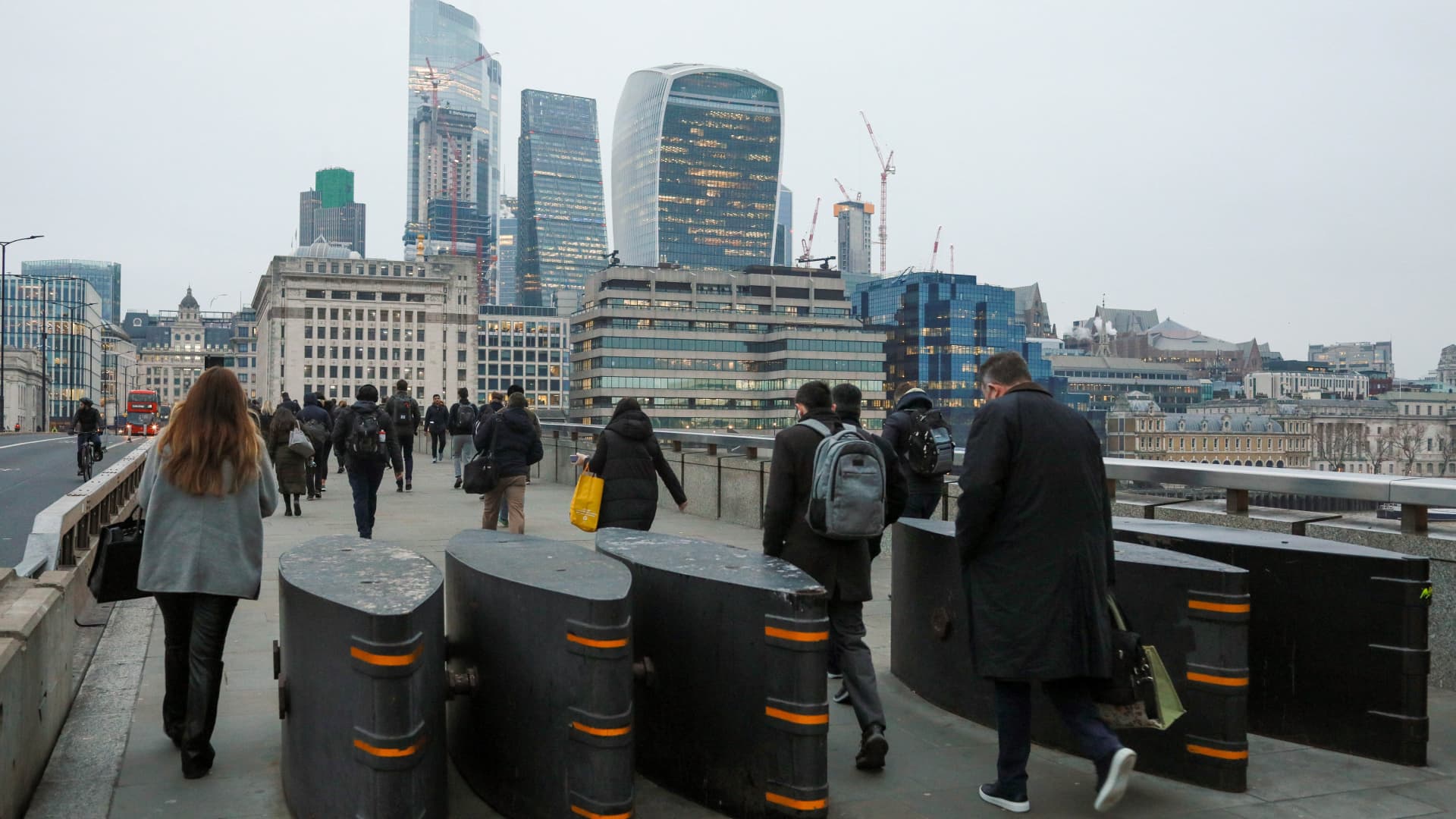
The U.K. economy shrank by 0.1% in March and the situation is expected to worsen as the country’s cost-of-living crisis escalates.
Tim Ireland | Xinhua News Agency | Getty Images
LONDON — A growth slowdown is underway in the U.K. after the economy shrank by 0.1% in March, with economists expecting further contractions this year.
Although the economy grew 0.8% for the first quarter as a whole, slightly below consensus forecasts for 1% growth, January was the only positive month of the quarter. The war in Ukraine and subsequent supply chain problems and energy price spikes have compounded the toll of inflation, which is running at a multi-decade high.
Sterling hit a two-year low versus the U.S. dollar following the data as traders digested growing uncertainty about the U.K.’s economic outlook.
The surprise monthly contraction in March — economists had expected the figure to come in flat — presents a worry for Prime Minister Boris Johnson’s government as the country’s cost-of-living crisis is yet to reach its peak.
“Ultimately, things are only going to get worse for consumers. Energy bills are expected to soar again later this year when the price cap is reassessed, while inflation is proving stickier than expected,” said Hinesh Patel, portfolio manager at Quilter Investors.
U.K inflation hit a 30-year high of 7% in March and in April, the country’s energy regulator increased its price cap by 54% to accommodate soaring prices. In the Queen’s Speech to mark the state opening of parliament on Wednesday, the government promised to focus on economic growth in order to address the spiraling cost of living.
Patel added that the Bank of England now faces a “near impossible task of managing the economy out of this quagmire.”
“They are in aggressive rate raising mode for now, but this cannot remain the case for long given the economic issues already starting to play out,” he added.
The Bank of England has hiked interest rates at four consecutive policy meetings as it looks to rein in inflation, and markets are pricing in another five hikes by spring of 2023.
However, James Smith, developed markets economist at ING, suggested that the central bank’s more cautious tone in recent weeks indicates that it will not meet these expectations, and may settle for a couple more hikes before hitting pause so as not to exert further downward pressure on economic growth.
Thursday’s GDP figures also showed that the U.K.’s dominant consumer-facing services industry took a substantial hit in March, falling 1.8% as consumer spending declined amid the squeeze on households.
Health spending to fall away
ING’s Smith said a second consecutive decline in output should be expected in April, coinciding with the end of free Covid-19 testing.
“Surprisingly, health output actually increased in March despite the ongoing wind-down of Covid-related activities, but clearly, that’s unlikely to last,” Smith noted.
“Health spending has been a key driver of GDP through the pandemic, and in fact, the overall size of the economy would be around 1% smaller had output in this sector stayed flat since early-2020.”
Caroline Simmons, U.K. chief investment officer at UBS Global Wealth Management, was also cautious looking ahead.
“There is growing potential for U.K. GDP to be negative in the second quarter, which is in part due to the consumer squeeze from energy price rises,” she said.
U.K. stocks insulated
As concerns about the growth outlook in the coming quarters grow, investors are also considering the impact it could have on markets.
However, Simmons noted that the U.K. economy is not representative of the U.K. equity market. UBS sees upside to the FTSE 100 index with a December target of 8,100; the FTSE was trading around 7172 mid-morning Thursday.
Importantly for the U.K., both labor demand and business investment intentions remain firm, reducing the risk of a sharp downturn in overall growth, according to Daniel Casali, chief investment strategist at Tilney Smith & Williamson.
The Bank of England expects growth to be flat in the second quarter, though Casali also noted that there is potential for a modest contraction.
“For investors, given that the large cap U.K.-listed companies derive the bulk of their sales abroad, it really is global growth that matters,” Casali added.
The IMF recently reduced its global growth forecast to 3.6% for 2022 and 2023, from 6.1% last year.
“Along with the sharp EPS gains made by the energy sector, the outlook for UK company profits has improved. The consensus forecasts 15% Earnings Per Share growth for 2022, a big pick-up from just under 3% at the start of the year,” Casali added.
“At the very least, rising company earnings (and cheap valuations) should limit U.K. equity downside in current volatile market conditions.”




